Inside the money laundering criminal network in Sydney’s pubs and clubs
They pour money into the poker machines without anyone giving them a sideways glance, but these suburban women are not trying to win a few bucks. Instead they are involved in something far more insidious.
Sydney Weekend
Don't miss out on the headlines from Sydney Weekend. Followed categories will be added to My News.
A woman sits down at a gaming machine at a busy western Sydney bowling club.
She carefully places her bag over the screen at the top of machine so that her play information – the number of bets she is making – is hidden.
She is alone, and does not speak to anyone. The woman also does not make any bets.
Instead, she quietly pushes her money into the machine slot before obtaining a ticket to have the same amount cashed out by the teller.
She will do this all again tomorrow.
By the end of her second day, the woman will have cashed almost $33,000.
Not that anyone will notice. After all, the woman is a regular gambler at the club, her face familiar to club staff.
No one suspects the woman of money laundering, especially not for a major crime syndicate that enlists ordinary gamblers to “wash” – or legitimise – tens of millions of dollars via gaming machines at pubs and clubs across the state.
That is, not until her two days of no-bet transactions are picked up by authorities scanning millions of gaming machine data collected by the hi-tech Centralised Monitoring System as part of an undercover intelligence operation.
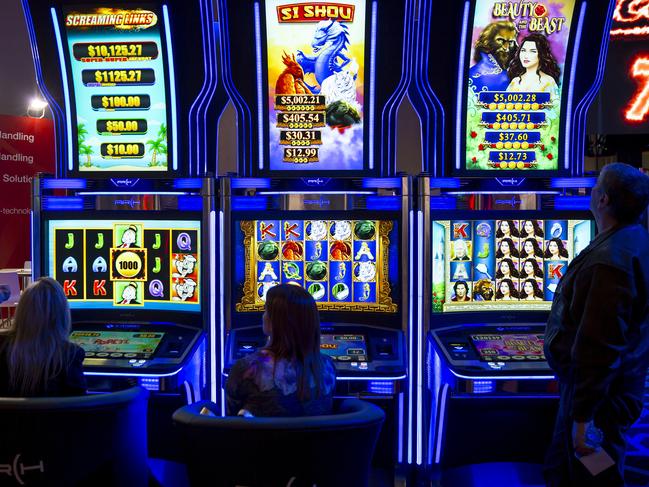
An updated system rolled out by the NSW government five years ago, the CMS enables authorities to view both historic and real-time transactions – including hours of play – by connecting every gaming machine located in a pub or club in the State.
Developed by Maxgaming, the company worked with NSW Liquor and Gaming to specifically develop technology that would enable the department charged with overseeing the regulation of more than 95,000 “pokies” around the state the ability to be able to look for signs of money laundering and fraud.
This includes money going in – and out – without play.
Conducted over seven weeks, the secret tripartisan operation comprising the NSW Crime Commission, state gaming regulator the Independent Liquor and Gaming Authority, and the Australian Criminal Intelligence Commission – operating as part of an intelligence-led anti-money-laundering project – would uncover an estimated $5.5m of suspicious transactions across 178 Sydney venues, connected to syndicates comprising more than 132 members believed to have links to organised crime.
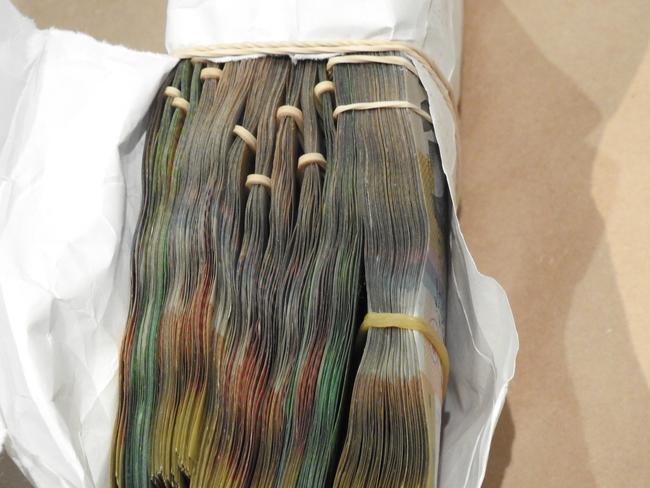
A highly sensitive internal report detailing the operation – obtained by News Corp – would later be attached to a letter sent to the Perrottet government by the independent gaming watchdog’s chair, Philip Crawford, who would demand a royal commission-style inquiry be convened.
This would not occur. Instead, the NSW Crime Commission would launch its own inquiry – but behind closed doors.
MONEY LAUNDERING
Money laundering has been around as long as criminals have, the term “laundering” attributed to 1920s mob boss Al Capone who set up laundromats to disguise the origin of cash he earned from illegal alcohol sales.
Nobody has the exact figure of how much money has been laundered in NSW, but most authorities agree it runs into the tens of millions.
Given that proceeds of crime are mostly in the form of cash, money laundering is a necessity in order for crime gangs to take advantage of their gains without arousing the attention of authorities.
While buying flashy cars and properties have always been popular options, criminals have to overcome increasingly tougher unexplained wealth laws. There is also the option of sending money overseas, or “cuckoo smurfing”, where money launderers exploit the bank accounts of customers expecting to receive legitimate funds.
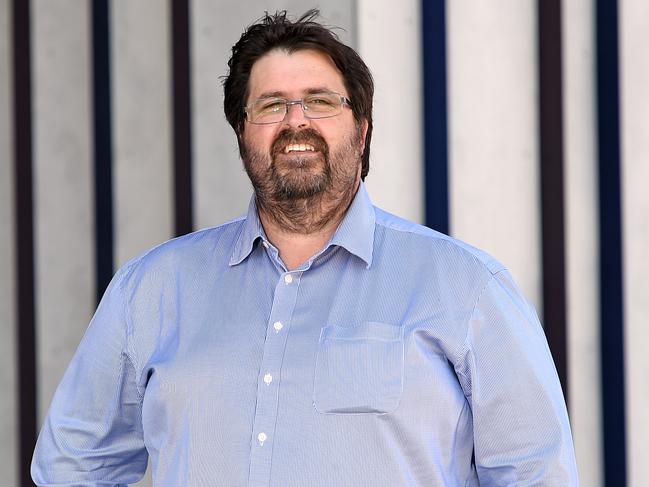
According to the Australian Transaction Reports and Analysis Centre (AUSTRAC) – the federal government agency responsible for detecting, deterring and disrupting criminal abuse of the financial system to protect the community from serious and organised crime – washing cash through gaming machines at venues was “more common” than people thought.
Done across multiple venues, criminals often engage regular customers to launder cash in between legitimate play to avoid arousing suspicion.
In some cases, they would collude or work to gain the trust of venue staff to avoid having to provide identification when collecting winnings.
Whistleblower and former Clubs NSW employee Troy Stolz once claimed as little as 5 per cent of clubs were complying with their obligations relating to anti-money laundering and counter-terrorism.
Criminals will also often seek out and attempt to take advantage of businesses operating gaming machines that do not have the proper resources or processes in place to identify or manage money laundering activities.
FLOOD OF DIRTY MONEY
With the pandemic hampering attempts by criminals to move funds offshore, the NSW Crime Commission predicted the lockdown had created a “significant cash storage”.
In its most recent annual report, the commission noted how Covid had hampered efforts, especially by outlaw motorcycle groups, to transfer funds made from sale of “large quantities of prohibited drugs” at “very high drug prices” offshore.
“This has led to significant cash storage, and in several cases, large cash seizures being made by law enforcement,” it said. “It is assessed that this trend is likely to continue.”
With the lifting of restrictions, the tripartisan group hypothesised that the reopening of gaming venues would result in a flood of dirty money into licensed venues across Sydney.
On the back of this hypothesis, the tripartisan group launched its operation. Multiple teams of investigators were assembled to examine thousands of transaction data points between October 11 and November 29.
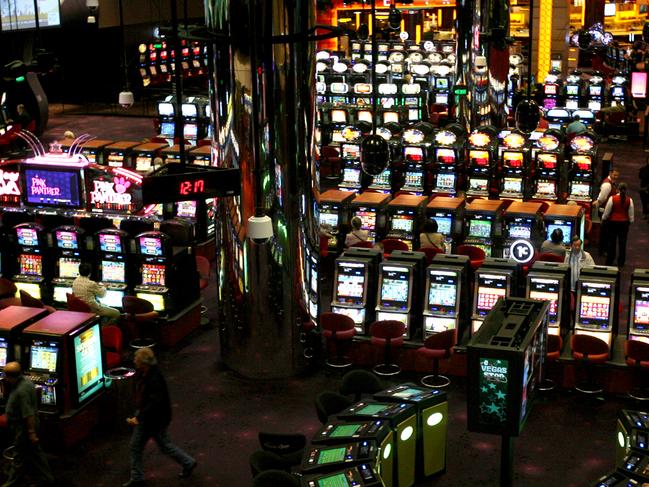
Due to the enormous volume of data, the investigators zeroed in on transactions where cash had gone in but there had been no or little play. They also focused on roulette machines, which are preferred by money launderers.
Where money laundering was suspected, the teams would track down the actual machine used before requesting the CCTV footage from the venue.
As the internal report would warn, the extent of suspected money laundering uncovered outstripped the available resources to even begin the fight.
Prior the investigation, the intelligence-led project had identified multiple organised groups operating at venues across Sydney.
It concluded the presence of these highly organised groups suggested a “long-term, high-volume” rate of potential money laundering was occurring across the state.
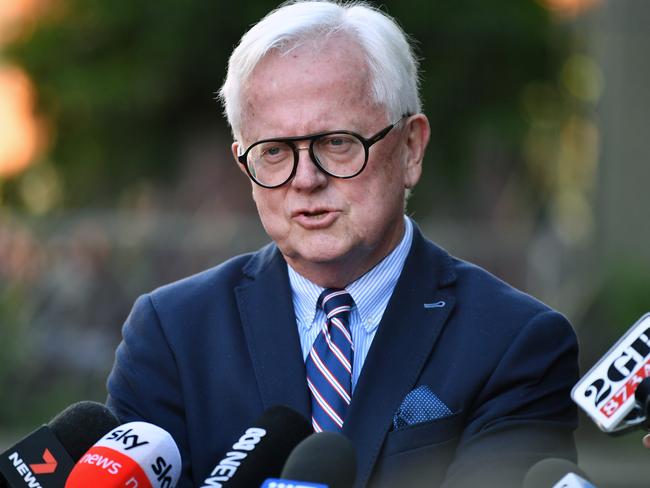
Of more concern, the nature of AUSTRAC and police reports connected to some syndicate members and their associates suggested money laundering was not their primary criminal activity.
The first syndicate was uncovered at St Johns Park after investigators honed in on $45,000 suspicious transactions in the investigation period.
Operated by a husband-and-wife team together with a third person, the syndicate is believed to comprise of more than 20 people operating across “at least” 23 venues.
An investigation into its activities suggest the syndicate has been operating since 2014, with defined roles among members as to “who plays the machines, feed the machines” and who handles and collects the cash.
While a preliminary overview by authorities suggests the syndicate has washed around $1m, the report concedes the figure to be likely much higher.
“Given the longevity of this syndicate and the number of members and venues, it is likely the real figure is at least in the tens of millions,” it said.
HOW THEY WORK
Another syndicate was uncovered operating out of an RSL club in Western Sydney, where CCTV footage showed five women seated at different gaming machines being discretely handed wads of cash by a man before they would feed it into the slots. Once the machine spat out a ticket, the women would hand the stubs to another man – well known to staff and regarded as popular among customers, although rarely seen playing the machines himself – who would cash it at a teller.
During the investigation period, investigators flagged more than 47,800 transactions as suspicious.
A third syndicate involving five people was identified operating at a Western Sydney bowling club, where a man was seen pushing $50 notes into a machine in four transactions totalling $5500 before cashing them out.
As the man – who is later identified as unemployed – feeds the machines, two other men are seen operating as “lookouts”.
After the cash is washed, the man meets a fourth man, also found to be unemployed, with both making their way to a silver Toyota Camry where a bag is retrieved.
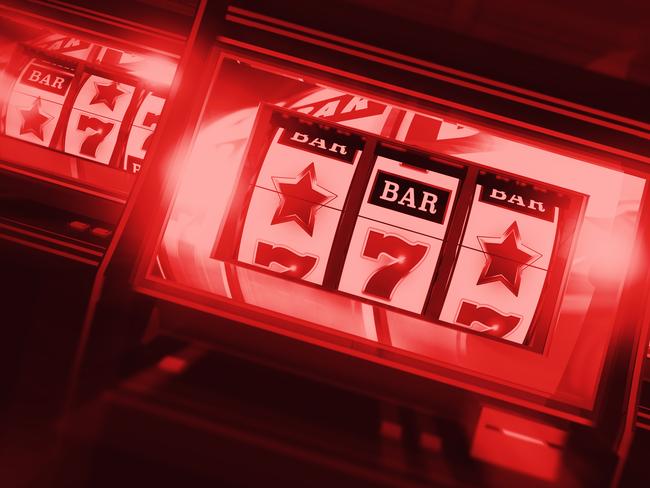
The money launderer takes the bag and places into a white Mazda driven by a fifth man, also unemployed, before the pair drive away.
Investigators reviewing the playing history of the man estimate he had washed $96,000 in one year. The NSW Crime Commission later confirmed the syndicate has links to organised crime.
Investigators also zero in on a man with possible links to an organised criminal syndicate whom they believe washed $60,400 through six gaming machines in under two hours at a second Western Sydney bowling club. A list of his transactions shows the cash was put into the machines in lots of $3500, with the same amount being withdrawn, sometimes within a minute.
The report said the man was “well known” to the venue, and that he also boasted about “putting even more” through a neighbouring sports club.
“They say he attends sometimes twice a day and puts through large amounts of cash,” the report said. “He often attends with other friends and family.”
On the day the man washed $60,400, he had been in the company of a second individual who collected the money using four separate visitor cards – despite the pair being club members – in a move that meant there would be no record of how much he put in or took out.
If investigators learned anything, it was that money laundering appeared to be rife.
The top 10 venues would account for 41 per cent of the $5.5m of suspicious transactions.
More than $1.4m would be washed in pubs and clubs in the Canterbury-Bankstown local government area with almost $1.3m in Fairfield, $366,000 in Cumberland, $333,000 in Inner West and $196,000 in Georges River councils areas.
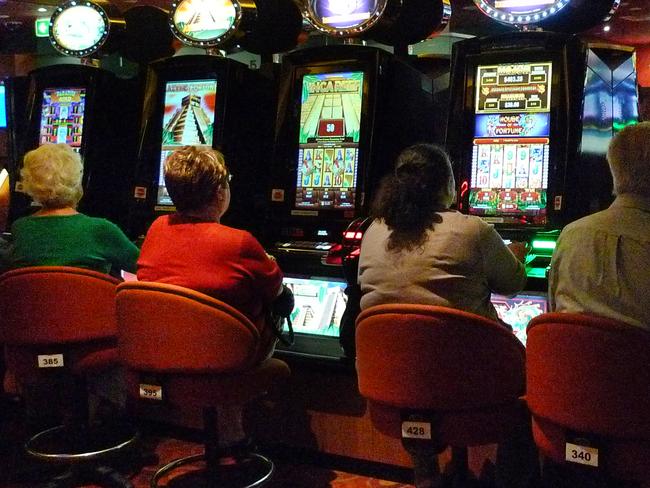
One club would record 344 suspicious transactions – topping the list – with another having the greatest volume of suspected dirty money laundered, amounting to $309,670.
So damning were the findings, the tripartisan team came to this explosive conclusion: “Evidence collected leaves little doubt that electronic gaming machines are being used for large-scale money laundering by organised criminal groups in NSW”.
“Without continued prioritisation and resource allocation in this space, it is unlikely that any other agency could address the issue to the extent that the behaviour would decrease.
“The number of findings relating to both suspicious transactions and identified individuals is exceeding the amount of current resources available within the regulator to maintain the thorough investigative approach used thus far.”
THE FIGHT FOR CHANGE
One month after the investigation, Victor Dominello – the minister in charge of NSW Liquor and Gaming and who had been working to clean up the sector – was stripped of his portfolio in a cabinet reshuffle.
It was handed to his Nationals colleague, Kevin Anderson, who is rumoured to have been ordered by his superiors to “quieten down” the portfolio before the March state election.
This also means scrapping plans for a cashless gaming card linked to identity that would have given money launderers fewer places to hide, given it requires cash to be loaded from their accounts.
Dominello, who had set up the Bergin inquiry that found Crown unfit to operate its casino in the state (it has since been allowed under strict conditions), had been advocating for the card. It would not only tackle “misery money” – cash used by problem gamblers – but also the “dirty money” of money launderers, he argued.
He was overruled by cabinet, with the government instead looking at “opt-in” digital payments.
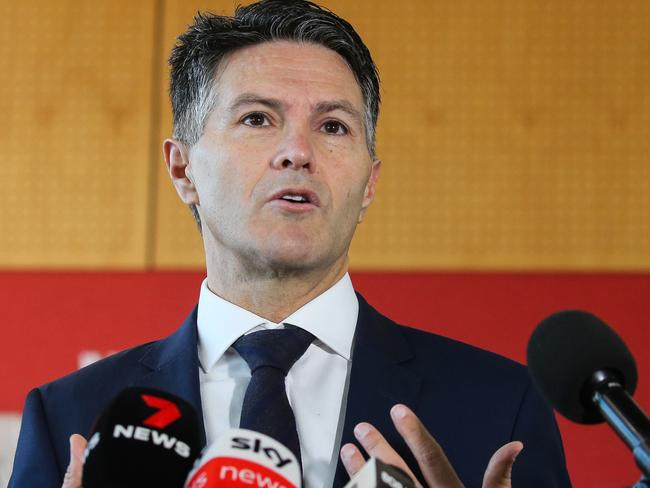
A request to Liquor and Gaming NSW by News Corp for an interview on money laundering was refused.
The department later offered a statement, declaring it was inappropriate to comment given the NSW Crime Commission inquiry was ongoing.
A separate inquiry to NSW Police was also refused, with a spokesman for the State Crime Command referring The Saturday Daily Telegraph back to NSW Liquor and Gaming.
At the same time, the leaking of the money-laundering report – which has understandably upset the club industry – has triggered a wide-scale departmental investigation, with sources declaring that the email trails of bureaucrats were being examined.
While Dominello may have been sidelined, there are many in parliament that are still fighting for change.
Independent NSW MP Justin Field – who noted how AUSTRAC had warned up to $69bn may have been potentially laundered through Crown – accused the government of trying to “ kick the problem down the road” until after the election.
“The proposal from the minister and Clubs NSW for an opt-in gaming card cannot be taken seriously,” he said.
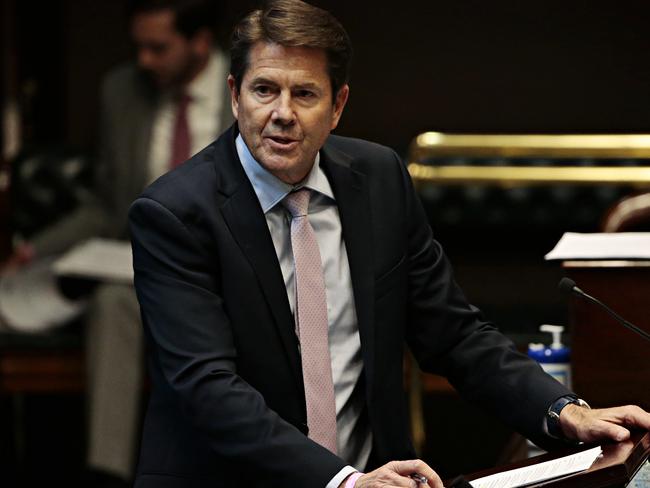
“The idea organised criminals would opt in to such a scheme is fanciful nonsense.”
A spokesperson for Clubs NSW said the industry had been in favour of people having the opportunity to play gaming machines using digital wallets for many years “just as they can pay for all other activities”.
Clubs NSW also remained open to further reforms: “Unlike some others, we recognise there are no silver-bullet solutions and will be guided by the recommendations of the NSW Crime Commission for how we can further help law enforcement agencies,” the spokesperson said.
Labor MP Hugh McDermott, whose electorate of Prospect has been the site of growing gangland violence and money laundering, said organised crime had become an “increasing concern” to families and police in his electorate, especially the state government’s “lack of action to keep our community safe”.
“Illicit drug trafficking and supply, human trafficking, money laundering, fraud, murder and extortion have grown significantly,” he said.
As for the inquiry, a source close to the commission – which will release its findings in August – claims it has uncovered “more than it thought it would”.



